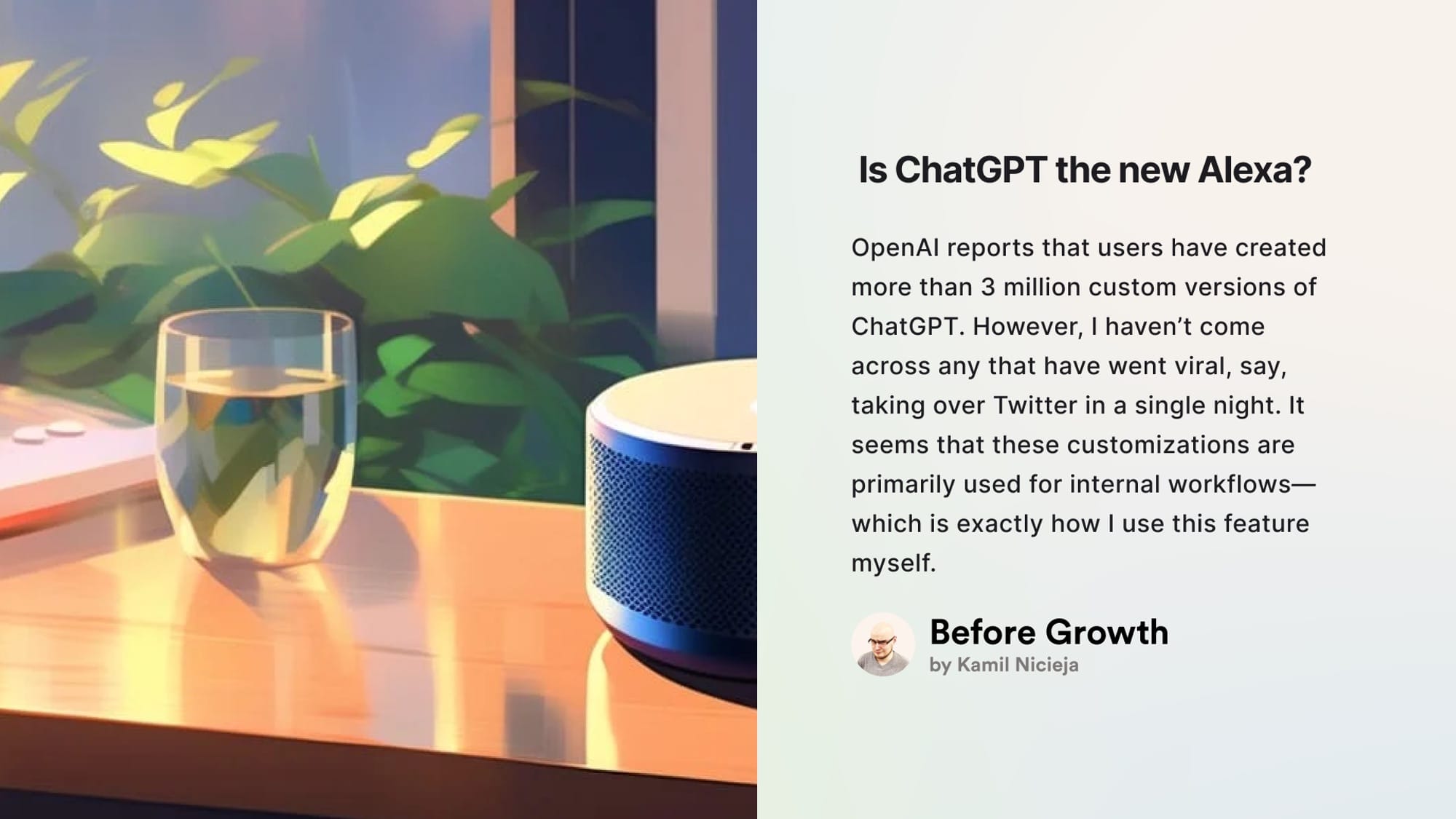There Are No Experts, There Is Only Us
Everyone has opinions about what you should do in times of crisis. This doesn’t mean they’re right.

- Focusing on crisis CEOs, survival, leadership challenges, and the ethos “no experts,” I talk about the entrepreneurial challenges and paradoxes within startup culture.
- OpenAI recently introduced custom GPTs for ChatGPT Plus users. These allow users to create their own personalized versions of ChatGPT without any coding required. I’m sharing my thoughts on this.
- Are GPTs bots, apps, knowledge bases, personas, or agents? What are the best terms to use when thinking about them in a practical and productive manner?
We’re at war.
Four-day workweeks are out; fiscal responsibility is in. Following fifteen years of calm, it’s now the era of wartime CEOs. As Ben Horowitz puts it, during a “wartime” scenario, a company faces immediate, critical threats to its survival. In such times, the most effective executives are those who exert every effort to ensure their company’s survival.
But leading during a crisis is hard. There’s a lot of pressure and so many unknowns.
A while back, I came across a thought-provoking essay called Solitude and Leadership by William Deresiewicz. He originally presented it as a speech to new cadets at West Point. Deresiewicz made a point that resonates with the concept of leadership during tough times: “If you want others to follow, learn to be alone with your thoughts.” Ben Horowitz mentions, “as CEO, you should have an opinion on absolutely everything.” And startup mythology is full of stories about Steve Jobs the Genius doing whatever it took to win, and how Larry Ellison the Badass calculated revenue the way he damn well pleased.
Running a startup often leads people to believe they must become hands-on non-micromanaging non-workaholics who do 16-hour shifts and still find the time to start a family, practice mindfulness, go to the gym, fast, or whatever the fuck the latest trend is. This can be confusing—I know it was to me. You might also feel like your competitors don’t seem as internally conflicted as you are. So, in an effort to take back control, there will likely come a time when you start to doubt your own methods.
Should you, though?
As you might have noticed by now, I often find insights in books. One such book is Elastic Leadership by Roy Osherove. It delves into the development of self-organizing teams and the challenges their leaders face. The book opens with two simple sentences: “There are no experts. There is only us.” Osherove mentions feeling a sense of loneliness from these words, interpreting them as a reminder that there’s no one else to rely on.
I want to share how these same words make me feel less alone.
Whenever I encounter someone speaking confidently about what I must do, I remind myself: there are no experts, only us. When leading a startup, keep in mind that everyone will have their own opinions. Your choices are visible to all. Well-meaning people will give advice that may leave you unsure, and they’ll frequently do so with great confidence, which isn’t always justified.
Whenever I feel pressured to be something different than I am, something our industry came to expect in our idealization of grandiosity, of genius, things no real person can possibly be, I tell myself that, just like there are no experts, there are no perfect leaders, either. There is only us.
In those two sentences, I don’t find loneliness. Instead, I discover a sense of freedom.
However, freedom comes at a cost. Sometimes, being an entrepreneur feels almost masochistic. At its best, it’s challenging; at its worst, it’s downright awful. During those tough times, I often find myself reflecting on why I began running a startup in the first place.
My response has consistently been, “because I love it.” And I truly do love it—not every aspect, perhaps, but it’s important to recognize that the rewarding parts wouldn’t exist without the challenging ones. I’m passionate about the creative process, finding dignity and satisfaction in crafting a product that's never existed before and pouring my skills into it. The excitement of turning it into a business is also exhilarating. Defining and validating assumptions, evolving a product into a company, tackling sales and marketing—all these are challenges that I find worthy of my time and effort.
Why not devote your time to something meaningful, pushing yourself to the very limits of your capabilities? It doesn’t seem like a bad idea to me.

It’s also a remarkable privilege to realize that there are others willing to invest their time just as you do. This is particularly true in the tech industry, where skilled professionals are in high demand globally and can leave their jobs at any moment. Yet, they choose to stay. This choice fosters a mutual trust. I believe that as long as we keep this in mind, we’ll be okay. Because there are no experts, just us—and we are intelligent, resourceful, and well-meaning. We have the power to set our own standards, expectations, and models, independent of the startup mythology’s expectations. In my view, this is how our work can truly reflect the human condition: the innate desire to create and do right by others, a quality we all possess but sometimes overlook.
In this intention, I find the strength to persevere and keep doing what I believe is right, regardless of the pressure outside—in both peacetime and wartime.
Custom GPTs
All ChatGPT Plus subscribers can now access new ChatGPT features, custom GPTs included, allowing us to observe their real-world applications and performance.
I planned to write a detailed article on this subject last week. However, upon reflection, I realized I had less to discuss than anticipated. As a result, the week’s primary focus shifted, and I’m providing a brief update now instead.
A lot is happening at the same time:
- Creators are discovering that building a successful bot on ChatGPT’s large platform can attract up to 8,000 users.
- They’ve also noticed that OpenAI’s public catalog ranks highly on Google, so there are SEO benefits, too.
- They’ve realized that the new model, like all others, is susceptible to prompt engineering attacks: this means that with some finessing, you can access the knowledge files provided to GPTs by their creators. That led to a leak of some compensation data. At this point, you should assume anything uploaded to ChatGPT might as well be semi-public.
People are looking at how GPTs are used, too. Some who already know a lot about LLMs say that after trying them out, they feel that the new features aren’t very useful. They think they can just make their own prompts almost just as easily—so they don’t get why these bots are helpful.
This reminds me of a well-known comment on Hacker News about Dropbox: “For a Linux user, you can already build such a system yourself quite trivially by getting an FTP account, mounting it locally with curlftpfs, and then using SVN or CVS on the mounted filesystem.” Just like that, prompt engineering is still hard for most people. It’s a new skill they haven’t mastered. I think for the more complex prompts, they might never get the hang of it. It's tough and seems pointless. That's exactly why we have software products.
So I believe if GPTs can make advanced features more user-friendly for those with less technical expertise, that would be a big success for OpenAI. I’m not entirely happy, though. For me, the main issue with GPTs is that I'm unclear about their nature. Are they apps? New types of chatbots? Or are they autonomous agents because they have the ability to use external APIs?

Better plugins?
Maybe they’re just an advanced form of plugins. Let’s begin with that idea, as it’s as reasonable a starting point as any.
Did people actually use ChatGPT’s plugins? I didn’t, and I’m not aware of anyone who did, at least on a regular basis. As far as I know, OpenAI didn’t share how many people used them, so we’re left to guess.
It’s possible that the plugins were successful, leading the ChatGPT team to develop GPTs further from this idea. Alternatively, the plugins might not have done well, but the team still liked the concept of turning their product into a platform, so they tried a new approach. Personally, I’m inclined to think it’s the latter. If plugins were effective, there wouldn’t be a need to replace them. They could have just continued to develop that idea.
This post offers just a taste
Ready to stay ahead of the curve? Unlock the full experience and gain access to hand-picked tech industry intel. Don’t miss out on the ideas that will shape the next decade—subscribe to Before Growth now.
SubscribeAlready have an account? Log in




